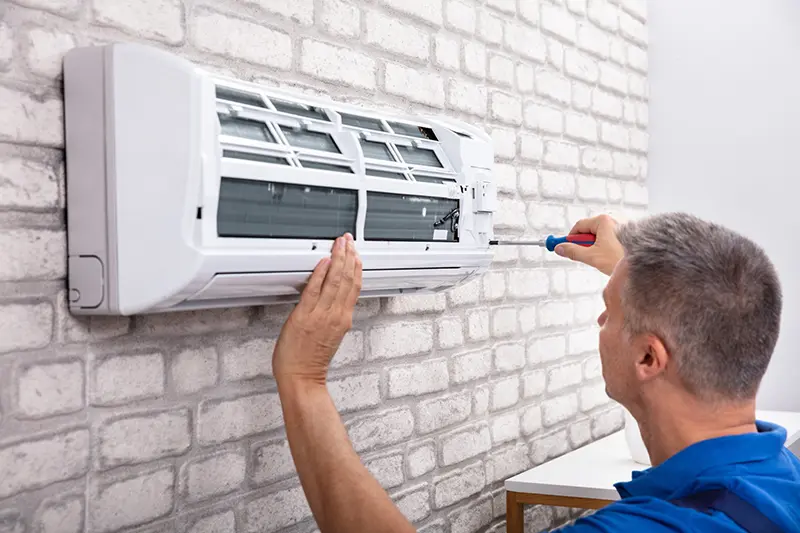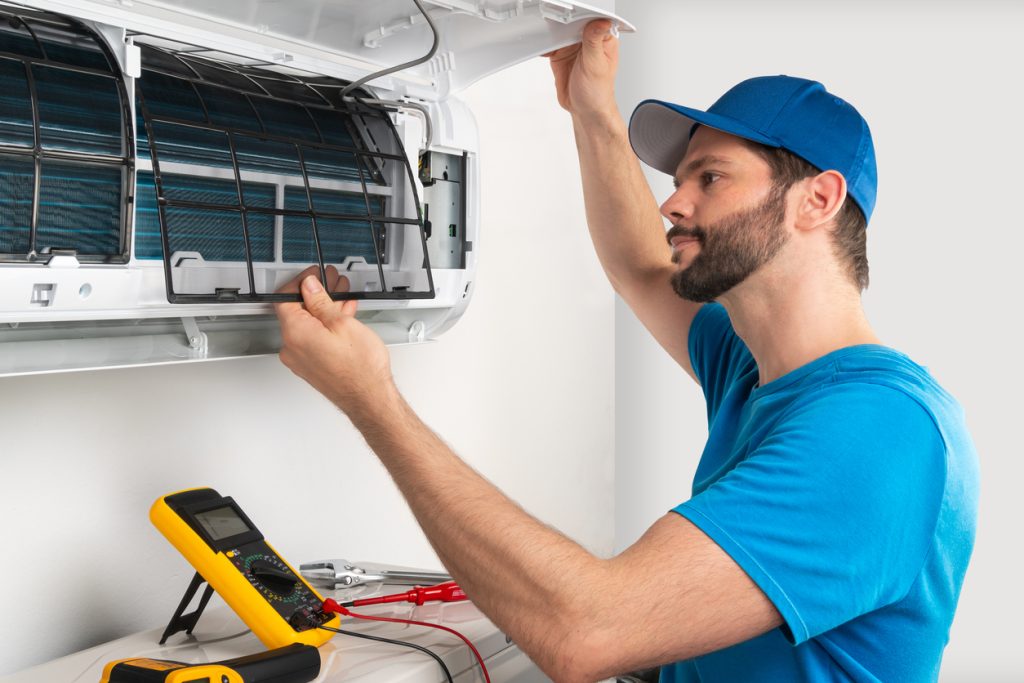Our Ac Repair Ideas
Some Known Details About Ac Repair
AC Air Conditioner Repair: Specialist Cooling System Restoration Guarantees Your Home Remains Comfy Throughout The Year
Kinds Of A/c Systems
When tackling AC repair, comprehending the type of air conditioning system you're dealing with can conserve time, cash, and aggravation. Ever wondered why some units cool a room much faster than others? Or why specific systems seem to break down more often? Let's peel back the layers.
Central Air Conditioning
Air Conditioning Repair Fundamentals Explained
Imagine a cool breeze streaming through an entire home, whispering convenience into every corner. Central air systems do precisely that. They use a network of ducts to distribute cooled air, depending on a compressor and condenser outside, matched with an evaporator coil inside. When this complex monster fails, identifying the problem can be like discovering a needle in a haystack.
Split Systems

Split systems are a popular choice for lots of homes-- part indoor unit, part outdoor compressor. They use flexibility and effectiveness, but their dual nature indicates repair work can include either element. Have you ever heard an odd sound outside your house only to find the indoor unit isn't cooling? That's a timeless indication of a split system problem.
The Best Guide To Ac Repair
Window Units
These compact warriors battle summer season heat by fitting comfortably into a window frame. They integrate all components into a single box. Their simplicity often suggests less repair work headaches, however neglecting filters or enabling particles buildup can result in reduced performance or breakdowns.
Ductless Mini-Splits
The Ac Fixing Diaries
Ductless systems bypass ductwork completely, making them ideal for homes without existing ventilation. They're peaceful, effective, and surprisingly resilient. When repairs are needed, professionals must be skilled at managing refrigerant lines and electrical connections-- no little task.
Quick Reference Table
| Type | Key Features | Common Repair Issues |
|---|---|---|
| Central air conditioning | Ductwork, whole-house cooling | Duct leakages, compressor failure |
| Split System | Indoor & & outside systems | Refrigerant leaks, fan motor concerns |
| Window Unit | All-in-one, simple installation | Unclean filters, electrical faults |
| Ductless Mini-Split | No ducts, zoned cooling | Line leaks, sensor breakdowns |
The Basic Principles Of Air Conditioning Repair
Unraveling the Many Regular AC Dilemmas
Have you ever wondered why your air conditioner suddenly stops cooling during a sweltering afternoon? One common offender is an unclean or stopped up air filter. This tricky villain restricts air flow, forcing your system to work overtime, which not only minimizes efficiency but can also lead to early breakdowns. Picture attempting to breathe through a scarf taken in dust-- it's tiring!
Another regular misstep is refrigerant leakages. These unnoticeable leaks don't simply reduce cooling power but can also damage the compressor, the heart of your a/c unit. How frequently do you look for uncommon hissing sounds or ice development on the coils? Catching these indications early can save you from pricey repair work down the line.
Beyond the Fundamentals: Lesser-Known Issues
The Greatest Guide To Air Conditioning Repair
In some cases, the thermostat itself is the nuisance. Miscalibrated or malfunctioning thermostats send out combined signals, causing the AC to cycle erratically. Ever knowledgeable your AC turning on and off in fast succession? That's called brief biking, a sly efficiency drainer that can use out parts faster than you 'd anticipate.
Electrical problems, such as used electrical wiring or a malfunctioning capacitor, might prowl beneath the surface area. Air conditioning Repair Near Me. These frequently manifest as a/c units failing to start or suddenly closing down. An expert eye understands to check these parts with precision tools, something a casual look won't expose
Professional Tips for Diagnosing Common Air Conditioner Problems
Ac Air Conditioner Repair Can Be Fun For Everyone
- Examine and replace air filters regularly-- every 1 to 3 months depending upon usage and environment.
- Listen for uncommon noises like rattling or buzzing that could indicate loose parts or electrical faults.
- Examine the outdoor unit for debris or blockages that impede air flow and trigger getting too hot.
- Search for frost accumulation on evaporator coils, a hint towards refrigerant issues or air flow limitations.
- Check the thermostat settings and recalibrate if the temperature readings feel off.
Quick Reference Table: Symptoms & & Probable Causes

| Symptom | Probable Cause | Professional Pointer |
|---|---|---|
| Warm air blowing | Low refrigerant or unclean coils | Clean coils and examine for leaks instantly |
| Short biking | Thermostat issues or large system | Change thermostat settings and speak with sizing standards |
| System won't start | Electrical faults or capacitor failure | Test electrical wiring and change capacitors as needed |
| Water leak | Clogged drain line or frozen evaporator | Clear drain lines and inspect for coil icing |
DIY Air Conditioner Maintenance Tips
The Ultimate Guide To Air Conditioning Repair Near Me
Ever seen your a/c unit sputtering like an old engine on a hot summer season day? Disregarding subtle indications typically implies more than just a sweaty afternoon-- it's a start to unanticipated a/c repair costs. But what if you could capture those whispers before they turn into wails? Regular DIY upkeep can be your first line of defense.
Simple Steps to Keep Your A/c Running Smoothly
All About Air Conditioning Repair Near Me
- Clean or Replace Filters: A blocked filter resembles attempting to breathe through a scarf. Every 1-3 months, inspect and swap out your filters. It improves air flow and performance, preventing compressor stress.
- Inspect the Condenser Coils: Dust and particles function as undetectable blankets smothering your system's cooling power. Carefully brush or vacuum the coils, but avoid extreme chemicals that may deteriorate the metal.
- Inspect the Drain Line: When was the last time you glimpsed at your drain pan? A stopped up drain can trigger water leakages and foster mold growth. Flushing it with a vinegar solution monthly keeps the flow clear.
- Seal and Insulate: Are your ductworks whispering leakages? Sealing spaces with mastic or foil tape increases effectiveness and cuts down on unequal cooling.
Pro Tips Beyond the Basics
- Procedure your unit's voltage to catch subtle electrical wear before it triggers big issues.
- Listen for unusual hums or rattles-- these acoustic breadcrumbs often signal loose parts or failing motors.
- Keep outside units shaded but guarantee a minimum of 2 feet of clearance around them for optimal air flow.
Ask yourself: Are you hearing your air conditioning's peaceful SOS or just awaiting it to scream? Requiring time for DIY air conditioner upkeep transforms reactive repair work into proactive read more care, saving sweat, stress, and yes, money.
Indicators on Air Conditioning Repair You Need To Know
Why Know-how in Air Conditioning Repair Work Matters
Envision this: your AC unit sputters and groans throughout a scorching afternoon, leaving you sweltering indoors. Would you trust a novice fumbling with fragile elements, or would you seek the peace of mind of a expert a/c technician!.?.!? The intricacies of modern-day cooling systems demand precision and experience. A minor mistake can intensify a small malfunction into a pricey disaster.
Some Known Factual Statements About Fix Air Conditioner
Unseen Complexities Behind the Cool Breeze
Many ignore the layers concealed beneath the smooth outside of an AC unit - Air conditioning Repair Near Me. From refrigerant leaks that quietly drain effectiveness to faulty thermostats that misread temperature levels, these concerns need more than a basic toolkit. Professionals possess a keen eye for identifying issues that average property owners overlook
Important Tips for Selecting the Right Technician
Some Known Details About Ac Repair
- Certification and Training: Confirm credentials; a specialist trained in the most recent HVAC technologies is invaluable.
- Experience with Particular Systems: Not all a/c systems are produced equal; find someone familiar with your model's peculiarities.
- Diagnostic Method: Proficient service technicians use advanced tools-- like electronic leakage detectors and thermal imaging-- to identify surprise faults.
What to Expect from a Pro's Diagnostic Process
| Action | Purpose | Specialist Insight |
|---|---|---|
| Visual Examination | Recognize apparent wear or damage | Look for corrosion or uncommon sounds-- an indication often overlooked |
| Pressure Checking | Identify refrigerant leaks | Subtle pressure drops can hint at micro leaks undetectable to the naked eye |
| Electrical Evaluating | Make sure circuit integrity | Loose connections can imitate serious mechanical failures |
The Definitive Guide for Air Conditioning Repair Near Me
Why Do It Yourself Typically Falls Short
Tempting as it is to play with your AC unit, DIY repairs regularly miss the origin. For instance, topping off refrigerant might briefly cool your area however disregards leaks that intensify in time. Professional technicians don't simply spot symptoms; they hunt down the underlying mechanical and electrical faults that sap performance.
The 25-Second Trick For Air Conditioner Repair Near Me
Questions to Ask Before Employing
- What diagnostic tools do you use to determine problems?
- Can you explain the repair procedure and expected outcomes?
- Are you acquainted with the refrigerants suitable with my unit?
- Do you follow security procedures for managing electrical elements?